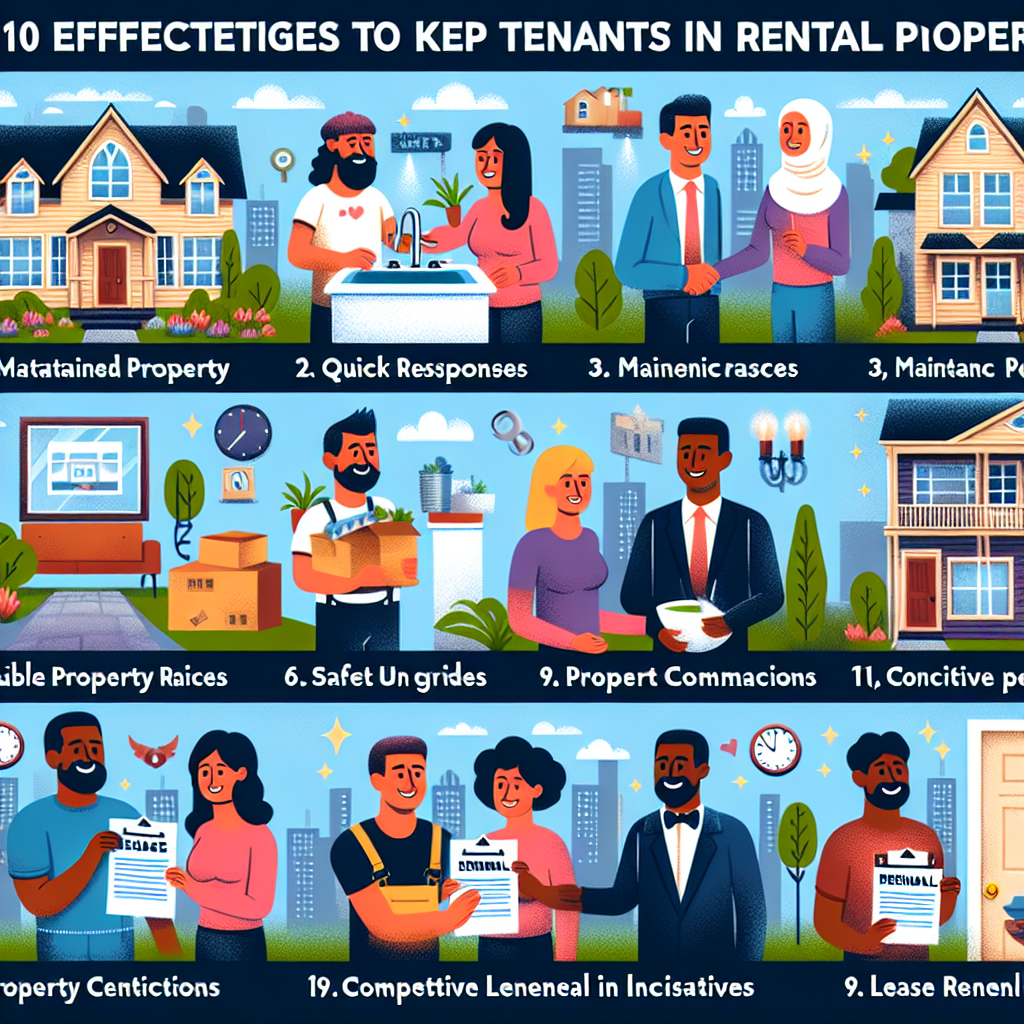-
Table of Contents
- 10 Effective Strategies to Keep Tenants in Your Rental Property
- 1. Maintain Open and Transparent Communication
- 2. Offer Competitive Rental Rates
- 3. Provide High-Quality Maintenance and Repairs
- 4. Create a Sense of Community
- 5. Offer Lease Renewal Incentives
- 6. Ensure Safety and Security
- 7. Offer Flexible Payment Options
- 8. Address Tenant Concerns Promptly
- 9. Keep the Property Well-Maintained and Clean
- 10. Build Strong Relationships with Tenants
- Conclusion
10 Effective Strategies to Keep Tenants in Your Rental Property

Retaining tenants in your rental property is crucial for maintaining a steady income and reducing the costs associated with tenant turnover. High turnover rates can lead to increased vacancy periods, additional marketing expenses, and the need for frequent repairs and cleaning. By implementing effective strategies to keep tenants satisfied and engaged, landlords can foster long-term relationships and ensure a stable rental income. This article explores ten proven strategies to help you retain tenants in your rental property.
1. Maintain Open and Transparent Communication
Effective communication is the cornerstone of a positive landlord-tenant relationship. Keeping the lines of communication open ensures that tenants feel heard and valued. Here are some ways to maintain transparent communication:
- Respond promptly to tenant inquiries and concerns.
- Provide clear and detailed information about lease terms, policies, and procedures.
- Use multiple communication channels, such as email, phone, and text messages, to accommodate tenant preferences.
- Regularly check in with tenants to address any issues before they escalate.
Case Study: A property management company in New York City implemented a tenant communication app that allowed tenants to submit maintenance requests, pay rent, and communicate with management. As a result, tenant satisfaction increased by 20%, and the company saw a significant reduction in turnover rates.
2. Offer Competitive Rental Rates
Setting competitive rental rates is essential for attracting and retaining tenants. Conduct market research to determine the average rental prices in your area and adjust your rates accordingly. Consider the following factors when setting rental rates:
- Location and neighborhood amenities.
- Property size and condition.
- Included utilities and services.
- Current market trends and demand.
Example: A landlord in San Francisco noticed that similar properties in the area were offering lower rental rates. By adjusting their rates to be more competitive, they were able to retain their current tenants and attract new ones, reducing vacancy periods.
3. Provide High-Quality Maintenance and Repairs
Timely and efficient maintenance is crucial for tenant satisfaction. Tenants are more likely to stay in a property where their maintenance needs are promptly addressed. Implement the following practices to ensure high-quality maintenance:
- Conduct regular property inspections to identify and address potential issues.
- Establish a reliable network of contractors and service providers.
- Implement a system for tenants to easily report maintenance requests.
- Prioritize urgent repairs and communicate expected timelines for completion.
Statistics: According to a survey by Buildium, 65% of tenants cited maintenance and repairs as a key factor in their decision to renew their lease.
4. Create a Sense of Community
Fostering a sense of community can enhance tenant satisfaction and encourage long-term residency. Organize events and activities that bring tenants together and create a positive living environment. Consider the following ideas:
- Host seasonal events, such as barbecues, holiday parties, or movie nights.
- Create common areas where tenants can socialize, such as a lounge or garden.
- Encourage tenant involvement in community initiatives, such as neighborhood clean-ups or charity drives.
- Establish a tenant newsletter to keep residents informed about upcoming events and property updates.
Example: A property management company in Chicago organized monthly social events for tenants, including game nights and potluck dinners. This initiative helped build a strong sense of community, leading to higher tenant retention rates.
5. Offer Lease Renewal Incentives
Incentives can motivate tenants to renew their leases and stay longer in your property. Consider offering the following incentives to encourage lease renewals:
- Discounted rent for the first month of the renewed lease.
- Upgrades or improvements to the rental unit, such as new appliances or flooring.
- Gift cards to local businesses or popular retailers.
- Flexible lease terms, such as shorter or longer lease durations.
Case Study: A landlord in Austin, Texas, offered tenants a $200 gift card to a popular local restaurant if they renewed their lease. This incentive resulted in a 15% increase in lease renewals.
6. Ensure Safety and Security
Tenants prioritize safety and security when choosing a rental property. Implement measures to create a secure living environment and give tenants peace of mind. Consider the following strategies:
- Install security cameras and adequate lighting in common areas and parking lots.
- Provide secure entry systems, such as keyless entry or intercom systems.
- Conduct background checks on all tenants to ensure a safe community.
- Regularly inspect and maintain security features, such as locks and alarms.
Statistics: According to a survey by Rent.com, 75% of tenants consider safety and security to be a top priority when choosing a rental property.
7. Offer Flexible Payment Options
Providing flexible payment options can make it easier for tenants to manage their finances and reduce the likelihood of late payments. Consider implementing the following payment options:
- Online rent payment portals for convenient and timely payments.
- Automatic payment options to ensure rent is paid on time each month.
- Flexible payment schedules, such as bi-weekly or semi-monthly payments.
- Accepting multiple payment methods, including credit cards, bank transfers, and digital wallets.
Example: A property management company in Los Angeles introduced an online payment portal that allowed tenants to set up automatic payments and pay rent using various methods. This initiative resulted in a 30% decrease in late payments and improved tenant satisfaction.
8. Address Tenant Concerns Promptly
Addressing tenant concerns promptly and effectively can prevent small issues from escalating into major problems. Implement the following practices to ensure tenant concerns are addressed:
- Establish a clear process for tenants to report concerns and complaints.
- Respond to tenant concerns within 24-48 hours.
- Keep tenants informed about the status of their concerns and the steps being taken to resolve them.
- Follow up with tenants to ensure their concerns have been satisfactorily addressed.
Case Study: A landlord in Miami implemented a tenant feedback system that allowed tenants to rate their satisfaction with the resolution of their concerns. This system helped the landlord identify areas for improvement and resulted in higher tenant satisfaction and retention rates.
9. Keep the Property Well-Maintained and Clean
A well-maintained and clean property creates a positive living environment and encourages tenants to stay longer. Implement the following practices to maintain your property:
- Conduct regular inspections to identify and address maintenance issues.
- Hire professional cleaning services for common areas and vacant units.
- Maintain landscaping and outdoor areas to enhance curb appeal.
- Ensure all amenities, such as laundry facilities and fitness centers, are clean and in good working condition.
Statistics: According to a survey by the National Apartment Association, 60% of tenants cited property cleanliness and maintenance as key factors in their decision to renew their lease.
10. Build Strong Relationships with Tenants
Building strong relationships with tenants can foster loyalty and encourage long-term residency. Implement the following strategies to build positive relationships with your tenants:
- Show appreciation for your tenants by sending thank-you notes or small gifts during holidays.
- Be approachable and friendly, and take the time to get to know your tenants.
- Address tenant concerns with empathy and understanding.
- Solicit feedback from tenants and use it to make improvements to the property and management practices.
Example: A landlord in Seattle made a point to personally welcome new tenants and check in with them regularly. This personal touch helped build strong relationships and resulted in higher tenant retention rates.
Conclusion
Retaining tenants in your rental property requires a proactive and tenant-centric approach. By maintaining open communication, offering competitive rental rates, providing high-quality maintenance, creating a sense of community, offering lease renewal incentives, ensuring safety and security, providing flexible payment options, addressing tenant concerns promptly, keeping the property well-maintained and clean, and building strong relationships with tenants, landlords can foster long-term relationships and reduce turnover rates. Implementing these strategies will not only enhance tenant satisfaction but also contribute to the overall success and profitability of your rental property.
In summary, the key takeaways for retaining tenants are:
- Prioritize effective communication and transparency.
- Offer competitive rental rates and lease renewal incentives.
- Ensure timely and high-quality maintenance and repairs.
- Create a safe, secure, and well-maintained living environment.
- Foster a sense of community and build strong relationships with tenants.
By focusing on these strategies, landlords can create a positive living experience for their tenants and achieve long-term success in the rental market.








